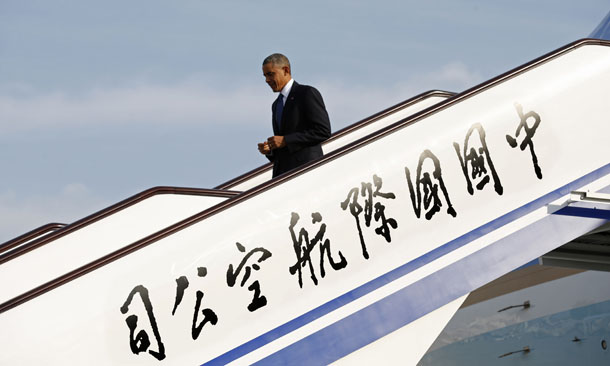BEIJING — His influence at home quickly fading, US President Barack Obama is looking east to China, the opening stop of a three-country tour that will test his ability to play a commanding role on the world stage during his final two years in office.
Once treated like a global superstar, Obama arrived Monday in Beijing under far different circumstances, with his most powerful days behind him.
At home, Republicans are still rejoicing at having pummeled Obama’s political party in the midterm elections, relegating Democrats to the minority in both chambers of Congress. His counterparts in Asia surely have noticed.
Upon his arrival in the Chinese capital, Obama stepped off Air Force One and onto a red carpet, where an honor guard of dozens lined his path. He greeted Chinese officials before being whisked into his waiting limousine.
First up for Obama was a sit-down with new Indonesian President Joko Widodo, who was sworn in last month amid high hopes of progressive leadership. Speaking through a translator, Widodo said his election showed that Islam and democracy can go together, and pledged to keep fighting extremism in his country.
Calling Widodo’s election “inspiring,” Obama said it was an “affirmation of the full transition Indonesia has made to a thriving democracy and a model for the kind of tolerance and pluralism that we want to see all around the world.” He suggested Widodo might even visit Washington next year.
Later Monday, Obama was to give a speech about US ties to Asia at a high-level Asia-Pacific Economic Cooperation summit, then join key Asian leaders for dinner and fireworks at the Beijing National Aquatics Center. During his three days in China, Obama will also meet with Chinese President Xi Jinping. The leaders of the world’s two largest economies will address reporters before the state visit draws to a close Wednesday and Obama flies to Burma.
The trip marks one of Obama’s final opportunities to deliver on his goal to amplify US influence in Asia. In China, Burma and Australia, leaders will be rendering judgment on whether Obama’s lofty ambitions in the Asia Pacific have been sidetracked by festering crises in Eastern Europe, Africa and the Middle East.
“This is going to be a tough trip for the president,” said Ernest Bower, an Asia expert at the Center for Strategic and International Studies in Washington. He said Asian leaders were viewing Obama’s trip with a key question in mind: Who is Barack Obama after the midterm elections?
“They’ll be trying to discern whether he has the commitment and political capital to follow through,” Bower said.
Even before the election, Obama’s commitment to the region and his ability to boost US clout there was in doubt in many capitals.
US allies such as Japan and South Korea have pressed for a greater American presence, partly to counter China’s growing influence. Yet Obama’s mission against the Islamic State group and his government’s Ebola response have diverted US military and financial resources elsewhere.
“The president remains deeply committed to his Asia rebalancing strategy, and its implementation will remain a top priority throughout the second term,” said Obama’s national security adviser, Susan Rice.
US presidents often immerse themselves in foreign affairs during their last years in office, when the focus on the next presidential race saps the energy from their own domestic efforts. In the wake of last week’s elections, White House officials spoke optimistically about Obama’s prospects for clinching trade deals in Asia and elsewhere now that Republicans are set to control Congress.
Under Obama, US trade negotiators for years have been pursuing the Trans-Pacific Partnership, a major trade pact being negotiated with 11 nations. The talks have repeatedly blown past their deadlines, and other nations have been wary about Obama’s ability to push an eventual deal through Congress, where Democrats have been sensitive to the concerns of labor unions.
But with Republicans in charge, Obama’s prospects may have improved, so the argument goes. Republicans tend to support trade deals as a way to boost the US economy, and Republican leaders have spoken positively about giving Obama so-called “fast track” approval that would subject the final deal to an up-or-down vote, preventing last-minute amendments that could sink the whole agreement.
China is not part of the talks, and is pursuing its own free trade deals in the region. What’s more, Chinese leaders have viewed Obama’s focus on Asia with suspicion, fearing an attempt to contain China’s growth and influence in the region.
In a sign of the political climate facing Obama in China, state-run media have been mocking him in the days before his visit.
“Obama always utters ‘Yes, we can,’ which led to the high expectations people had for him,” read an editorial in the English-language Global Times. “But he has done an insipid job, offering nearly nothing to his supporters. US society has grown tired of his banality.”
Another reminder of the tensions in the region came hours before Obama left on Saturday when North Korea released two American detainees after Obama’s spy chief made a secret mission to Pyongyang to secure their release.
In his meetings with Xi, Obama also plans to address human rights issues, officials said, including the treatment of journalists as well as pro-democracy protests in Hong Kong that erupted in September to the dismay of Chinese officials. Climate change—a key concern in smog-filled Beijing—and China’s aggressive behavior toward its neighbors are also on Obama’s agenda.

















